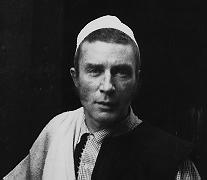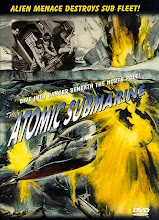Jerome Rothenberg has a new blog, and one of his first entries is about his relationship with Jackson Mac Low. Here's part of Jerry's entry:
I met Jackson Mac Low in 1960 or 1961, through the intervention, as I recall it, of Diane Wakoski. She had come to New York with LaMonte Young & there was clearly a connection between Jackson & LaMonte through an avant-garde that was centered on John Cage’s presence in New York & the international connections delineated by Fluxus. My first response to Jackson’s aleatory/chance experiments was a degree of puzzlement but a sense beneath that that something real & important was taking place. I fell for him first at a reading in which he introduced the first several of his Light Poems, impressed enough by those so that whatever else he did entered at once into the realm of my possibilities. And this was enhanced still more when he drew me into performing with him (as he did with many others) or, conversely, when he gave himself willingly to my own early attempts (circa 1969 or 70) at fusing poetry with performance. I often performed with him in his Gathas, & he was one of my performers (along with David Antin & Rochelle Owens) in a staged & recorded presentation of “primitive & archaic poetry” (circa 1967) that was the direct forerunner to Technicians of the Sacred.
There's more there, and here's the link to the rest of the entry.
Friday, June 13, 2008
Saturday, June 7, 2008
poet says: extremism is no vice
 The line that would put Barry Goldwater far to the anticommunist right in '64 was the same uttered by the popularly revered poet Kahlil Gibran (1883- 1931) in a book published in 1960 called "'Narcotics and Dissecting Knives,' Thoughts and Meditations":
The line that would put Barry Goldwater far to the anticommunist right in '64 was the same uttered by the popularly revered poet Kahlil Gibran (1883- 1931) in a book published in 1960 called "'Narcotics and Dissecting Knives,' Thoughts and Meditations":"In battling evil," Gibran had written, "excess is good; for he who is moderate in announcing the truth is presenting half-truth. He conceals the other half out of fear of the people's wrath."
Monday, June 2, 2008
attended Greenwich Village University
 Susan (Suze) Rotolo graduated high school in 1960. Her parents were communists (her dad dead by then, her mom quite active still although heading toward alcoholism). Suze didn't really think seriously about college. It was the time: she began subwaying in to lower Manhattan and eventually didn't take the return train--just stayed. Met Bob Dylan in '61 and was with him, mostly on but later on and off, until late '63. A working-class Italian girl, few prospects - but she was bright and artsy and game, and directly but mostly, alas (she admits to having been a "minor character"), indirectly had a major intellectual impact on the 60s. Much more here.
Susan (Suze) Rotolo graduated high school in 1960. Her parents were communists (her dad dead by then, her mom quite active still although heading toward alcoholism). Suze didn't really think seriously about college. It was the time: she began subwaying in to lower Manhattan and eventually didn't take the return train--just stayed. Met Bob Dylan in '61 and was with him, mostly on but later on and off, until late '63. A working-class Italian girl, few prospects - but she was bright and artsy and game, and directly but mostly, alas (she admits to having been a "minor character"), indirectly had a major intellectual impact on the 60s. Much more here.
Subscribe to:
Posts (Atom)

 Is '60 the moment when the end of the end of the Old Left had been reached and the New Left began to emerge? Is it the final ascendancy, in certain scenes at least, of poetic postmodernity? Surely the publication of Donald Allen's The New American Poetry that year suggests this, but then again--once again--we look back on "New" here and see continuity. The rhetoric of the Kennedy-Nixon contest made much less of a dent than everyone (at the time as well as since) claimed, so one wonders why were such great claims made?
Is '60 the moment when the end of the end of the Old Left had been reached and the New Left began to emerge? Is it the final ascendancy, in certain scenes at least, of poetic postmodernity? Surely the publication of Donald Allen's The New American Poetry that year suggests this, but then again--once again--we look back on "New" here and see continuity. The rhetoric of the Kennedy-Nixon contest made much less of a dent than everyone (at the time as well as since) claimed, so one wonders why were such great claims made?  Had we come to expect "1960" to be truly ubiquitously modern in a way that the 1950s really were not--not quite? And what specifically does "modern" mean in the Kennedyesque talk then and now about the torch being passed to a new generation, etc.? The First Lady really meant "modernist" when Camelotians said "modern." What about the others across the new young cultural leadership? I've been surprised by how frequently the
Had we come to expect "1960" to be truly ubiquitously modern in a way that the 1950s really were not--not quite? And what specifically does "modern" mean in the Kennedyesque talk then and now about the torch being passed to a new generation, etc.? The First Lady really meant "modernist" when Camelotians said "modern." What about the others across the new young cultural leadership? I've been surprised by how frequently the  "Beat movement" was covered in 1960 in the mainstream press. I was expecting a fair measure but I've found tonnage. 1960 was the year when the figure of the beat was beginning to find acceptance, although still 80% of these stories are mocking, rebels-without-cause condescension. For anyone whose analysis made an impact nationally, do these antipolitical adolescents count as part of the "new young cultural leadership"? No, but rather than the two being opposites, they fall along a Continuum of the New American. Now that's a change for '60.
"Beat movement" was covered in 1960 in the mainstream press. I was expecting a fair measure but I've found tonnage. 1960 was the year when the figure of the beat was beginning to find acceptance, although still 80% of these stories are mocking, rebels-without-cause condescension. For anyone whose analysis made an impact nationally, do these antipolitical adolescents count as part of the "new young cultural leadership"? No, but rather than the two being opposites, they fall along a Continuum of the New American. Now that's a change for '60.







